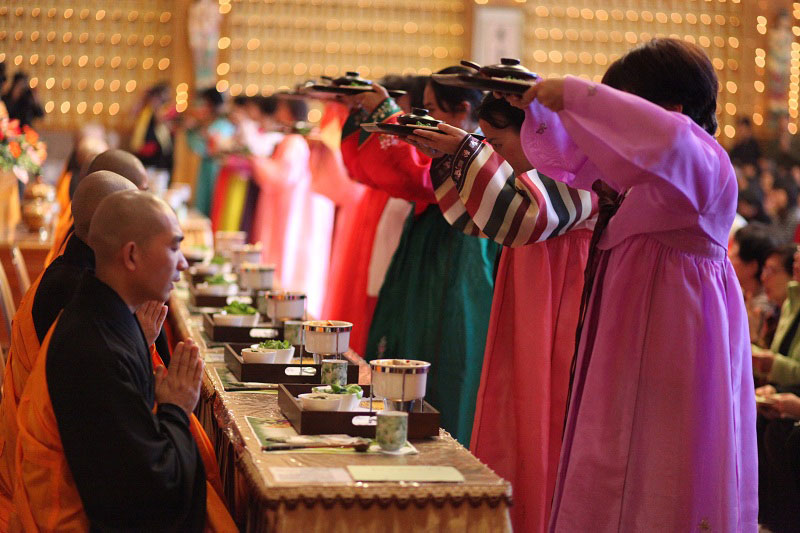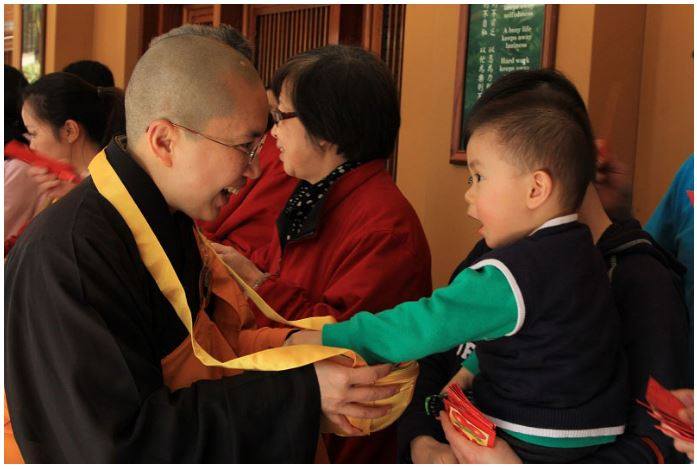Ullambana Festival
The Ullambana Sutra is a Mahayana sutra which consists in a brief discourse given by the Gautama Buddha principally to the monk Maudgalyayana on the practice of filial piety.

In the Ullambana Sutra, the Buddha instructs his disciple Maudgalyayana on how to obtain liberation for his mother, who had been reborn into a lower realm, by making food offerings to the sangha on the fifteenth day of the seventh month. This practice is the basis of the East Asian Ghost festival, including the Bon Festival, in honor of one's ancestors.
Buddhist tradition held that the sutra was translated from the Sanskrit by Dharmarakṣa. "Recent scholarship however, acknowledges that this sutra was not originally composed in India but in China in the mid-sixth century

Keeping aside all the variations, Ullambana has it's origin in Buddhism. This festival is celebrated on the 15th day of the 7th lunar month in many countries, infuenced any how with Buddhism as China,Japan,Malaysia etc. This is believed that the 'Gates of the Hell' are opened and and the dead ones pay visit to their loved ones. So, the offerings are offered to the spirits of the dead and to the hungry ghosts for good fortune and luck.
Ullambana, a sanskrit word means rescuing those who are hanging upside down. This is a key Mahayana Buddhist concept based on the story of 'Mahamaudgalayana saving his mother'.It is refered as 'seeking salvation for the anguished soul in hell'. Ullambana Sutra is a discouse given by the Buddha principally to the Mahamaudglayana on the practise of the filial piety.
Ullambana, a sanskrit word means rescuing those who are hanging upside down. This is a key Mahayana Buddhist concept based on the story of 'Mahamaudgalayana saving his mother'.It is refered as 'seeking salvation for the anguished soul in hell'. Ullambana Sutra is a discouse given by the Buddha principally to the Mahamaudglayana on the practise of the filial piety.

So, this festival mainly underlines the filial piety. It encourages us to perform the good deeds to exel not only ourselves but also our departed souls spiritually so that they can have a better rebirth to end their sufferings.

On the 15th day of the 7th lunar month, Buddhists celebrate the day of the Buddha's rejoicing and the Sangha's Pravarna. It is believed that the marits and virtues derieved from making offerings to 'Triratna' or the Triple Gem on this day is greater than on ordinary days many times.On this day, Buddhists offer prayers both to their departed forefathers and to their living parents and elders.The Buddha had instructed Mahamaudglayana to make offerings of Pravarna food to the virtuous assembly of the Sangha on the last day of the rain season retreat (15th day of 7th month in the lunar calendar).Now, the exact same ritual is precticed among Buddhists.
In Chinese Ghost Festival (Chinese version of Ullambana) ritualistic offering food is prepared and hell money is burned to please the visiting ghosts and the spirits as well as deities and the ancestors.Miniature paper boats and lanterns are buried and released on water which means 'giving directions to the lost ghosts and spirits'.So, we can describe this festival as a communion between the living and the dead, Earth and heaven, as well as body and soul.

On this day, Buddhists offer prayers both to their departed forefathers and to their living parents and elders. It is generally believed that one who performs a good deed accumulates spiritual merit. It is considered an even more pious act when the merit earned is shared with departed souls. This act helps the dead to be reborn in good realms and alleviate his/her suffering. Ullambana is celebrated by Buddhists all over the world. Though there are slight variations in certain customs and beliefs in different countries, the fundamental rituals remain essentially the same. Besides offering prayers to the souls of deceased ancestors and welfare of their parents, people carry offerings, such as food, medicine and clothes, for monks and nuns in monasteries. In China and Taiwan, Ullambana has absorbed the traditional Ghost Festival, which has the similar goal of praying for the welfare of departed souls. The two festivals are together celebrated as Chung Yuan Putu, translated as "Mid-origin Passage to Universal Salvation". On this day, an offering of meat, together with a prodigious table of wine is made to one's ancestors and ghosts. The festival is known as Ching Ming Jie in Singapore, O-Bon in Japan and Vu Lan in Vietnam. The date of Ullambana depends on the calendar that is followed, and varies slightly in different parts of the world.

The RainBow
This festival is celebrated in all the countries with the slight variations but the main rituals remain almost the same. Besides offering the prayers to the souls of deceased ancestors and the welfare of their parents' people carry offerings as food, medicines and clothes for monks and the nuns in the monestries.
Ullambana and Chinese Ghosts Festivals-both of the festivals togather-are celebrated as Chung Yuan Putu or 'Mid Origin Passage to Universal Salvation'. But Chinese Buddhists sometimes differentiate both the festivals also.
This festival is known as Ching Ming Jie in Singapore, O- Bon in Japan and Vu Lan in Vietnam.
This festival also shares some similarities with the predominantly Mexican observance of El Dia de los Muertos.